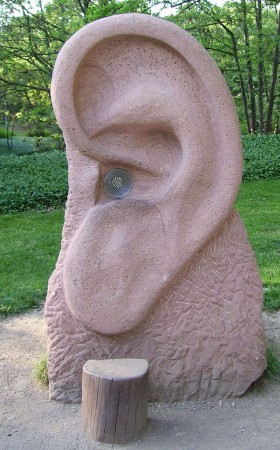 For my first blog post, I wanted to talk about a fairly obvious but incredibly important topic the skill and practice of critical listening.
For my first blog post, I wanted to talk about a fairly obvious but incredibly important topic the skill and practice of critical listening.
When much of our time and energy as audio engineers is spent zoomed in on developing sounds, it can be tiring to come home and want to really listen to music again. Sometimes I find myself wanting to sort of shut off to the experience; to put music on as background noise when I’m at home cooking, lounging, or even on my drive to or from work. It’s always good to have a balance, but I find when I can take time to listen to music mindfully, it provides an endless source of inspiration and helps me remember why I wanted to be an engineer in the first place!
Critical listening was one of the first ideas taught during my Recording Arts degree program at Indiana University, and I’m thankful my educators had the thoughtfulness to include this in our education. Going into the recording program at IU I was an avid music fan, musician, and music consumer, but I hadn’t quite grasped or even understood the value of critical listening practices until those first lessons. I remember searching for songs purely based on their sonic qualities – drum sounds, vocal reverbs, use of stereo field, dynamics, etc. We would be tasked with finding examples and then presenting them to the class to discuss our observations. It started to open my world in a way that made the idea of becoming an audio engineer much more tangible. It also helped me appreciate music in a different way, and, at the same time, develop a language to talk with others about what I was hearing.
As audio engineers, it is often our job to chase a sound. One of the first things that drew me to the field of was the idea that it could be a path of lifelong learning. Sometimes I’ll hear a guitar tone, a drum sound, the balance of vocals against a band in a mix, and it really captures me in a way that makes me want to learn how to recreate it. It’s a different kind of sonic earworm, one that brings me to a curious headspace saying to myself, “how did they do that?” I think this is extremely fun.
 I try to ask every artist I work with about what they are listening to at the time we begin a project; what inspired them while they were writing, what reference albums they may have of sounds they’re seeking, and what they grew up listening to. It’s so helpful to have these as learning tools and reference points for my work throughout the process of making a record. I can research and go into a project feeling like I have a better grasp of what sounds we’re trying to make while in the studio. It’s also helpful at an interpersonal level – the more I can relate to and understand where the musician is coming from, the more confident I can be in making decisions, suggesting ideas, and building common ground with them. Creating music is such a vulnerable and personal experience.
I try to ask every artist I work with about what they are listening to at the time we begin a project; what inspired them while they were writing, what reference albums they may have of sounds they’re seeking, and what they grew up listening to. It’s so helpful to have these as learning tools and reference points for my work throughout the process of making a record. I can research and go into a project feeling like I have a better grasp of what sounds we’re trying to make while in the studio. It’s also helpful at an interpersonal level – the more I can relate to and understand where the musician is coming from, the more confident I can be in making decisions, suggesting ideas, and building common ground with them. Creating music is such a vulnerable and personal experience.
There’s a certain language people use when discussing music that’s relatively consistent across the board, and it translates to practical applications. For instance, when someone tells me, “I want my kick to sound boxy,” or “I want my acoustic guitar to be less tinny” – although it sounds rather generic, those are particular and helpful requests. When a musician knows what they want, it becomes my job to find and capture the ideal sound in their head.
Think about your favorite songs, how would you sonically describe the guitars, bass, or the drums? Maybe you use words like “deep” or “round” or “smooth.” Maybe even “glossy” or “warm” or “rich.” The more you listen critically, the easier those words will come to you, and the easier it becomes to interpret and act on those requests.
I started a project last year where I collected a monthly playlist of songs to share publicly on Spotify. The platform is not perfect, but I enjoy the social aspect of sharing music with friends. I was a big mix-tape maker back in the day. My friends and I swapped CDs regularly and it was a big part of my musical discovery, Spotify is a little bit like that for me as an adult.
My playlist-making experiment started out as a way to collect and track some personal data on how my musical tastes were changing. I wanted to be able to highlight artists and songs I was listening to (or re-listening to), as markers on my musical timeline – some data to look back on in a few years. It became an exercise I really started to love doing, and it gave me an excuse to work on my critical listening skills. Each song selected is purposeful, the sequence of the songs is purposeful, and all the songs have a unique and special memory attached to them. By sheer accident, I created a soundtrack for my year, and a whole catalogue of songs I knew really, really well.
Critical listening skills are so invaluable to all audio professionals. Feel free to follow along to my monthly playlist or start your own, whatever works for you! Remember the importance of mindful listening, and why we’re engineers in the first place: to make great music people can connect with!